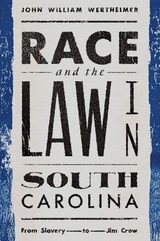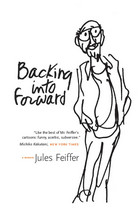
Subversive, funny, and effortlessly droll, Jules Feiffer’s cartoons were all over New York in the 1960s and ’70s—featured in the Village Voice, but also cut out and pinned to bulletin boards in offices and on refrigerators at home. Feiffer describes himself as “lucking into the zeitgeist,” and there’s some truth to the sentiment; Feiffer’s brand of satire reflected Americans’ ambivalence about the Vietnam War, changing social mores, and much more.
Feiffer’s memoir, Backing into Forward, like his cartoons, is sharply perceptive with a distinctive bite of mordant humor. Beginning with his childhood in Brooklyn, Feiffer paints a picture of a troubled kid with an overbearing mother and a host of crippling anxieties. From there, he discusses his apprenticeship with his hero, Will Eisner, and his time serving in the military during the Korean War, which saw him both feigning a breakdown and penning a cartoon narrative called “Munro” that solidified his distinctive aesthetic as an artist. While Feiffer’s voice grounds the book, the sheer scope of his artistic accomplishment, from his cartoons turning up in the New Yorker, Playboy, and the Nation to his plays and film scripts, is remarkable and keeps the narrative bouncing along at a speedy clip. A compelling combination of a natural sense of humor and a ruthless dedication to authenticity, Backing into Forward is full of wit and verve, often moving but never sentimental.
“Jules Feiffer’s original and neurotic voice. . . . reinvented comics in the 1950s and made possible what’s now called the ‘graphic novel.’ His engaging new memoir is told in that same witty and perceptive New York cadence, mellowed and laced with wisdom. He’s an inspiration.”—Art Spiegelman
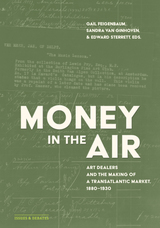
“There was money in the air, ever so much money,” wrote Henry James in 1907, reflecting on the American appetite for art acquisitions. Indeed, collectors such as Henry Clay Frick and Andrew W. Mellon are credited with bringing noteworthy European art to the United States, with their collections forming the backbone of major American museums today. But what of the dealers, who possessed the expertise in art and recognized the potential of developing a new market model on both sides of the Atlantic?
Money in the Air investigates the often-overlooked role of these dealers in creating an international art world. Contributors examine the histories of well-known international firms like Duveen Brothers, M. Knoedler & Co., and Goupil & Cie and their relationships with American clients, as well as accounts of other remarkable dealers active in the transatlantic art market. Drawing on dealer archives, scholars reveal compelling findings, including previously unknown partnerships and systems of cooperation. This volume offers new perspectives on the development of art collections that formed the core of American art museums, such as the National Gallery of Art, the Metropolitan Museum of Art, and the Frick Collection.
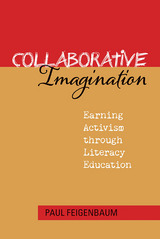
Processes of fighting unequal citizenship have historically prioritized literacy education, through which people envision universal first-class citizenship and devise practical methods for enacting this vision. In this important volume, literacy scholar Paul Feigenbaum explores how literacy education can facilitate activism in contemporary contexts in which underserved populations often remain consigned to second-class status despite official guarantees of equal citizenship. By conceiving of education as, in part, a process of understanding and grappling with adaptive and activist rhetorics, Feigenbaum explains, educators can direct people’s imaginations toward activism without running up against the conceptual problems so many scholars associate with critical pedagogy. Over time, this model of education expands people’s imaginations about what it means to be a good citizen, facilitates increased civic participation, and encourages collective destabilization of, rather than adaptation to, the structural inequalities of mainstream civic institutions. Feigenbaum offers detailed analyses of various locations and time periods inside, outside, and across the walls of formal education, including the Citizenship Schools and Freedom Schools rooted in the Civil Rights Movement of the 1950s and 1960s; the Algebra Project, a current practical-literacy network; and the Imagination Federation, a South Florida–based Earth-Literacy network. Considering both the history and the future of community literacy, Collaborative Imagination offers educators a powerful mechanism for promoting activism through their teaching and scholarship, while providing practical ideas for greater civic engagement among students.
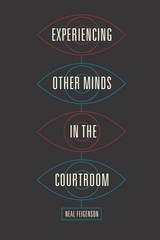
In Experiencing Other Minds in the Courtroom, Neal Feigenson turns the courtroom into a forum for exploring the profound philosophical, psychological, and legal ramifications of our efforts to know what other people’s conscious experiences are truly like. Drawing on disciplines ranging from cognitive psychology to psychophysics to media studies, Feigenson harnesses real examples of digitally simulated subjective perceptions to explain how the epistemological value of this evidence is affected by who creates it, how it is made, and how it is presented. Through his close scrutiny of the different kinds of simulations and the different knowledge claims they make, Feigenson is able to suggest best practices for how we might responsibly incorporate such evidence into the courtroom.

The result is a compendium of data and analysis that can be found nowhere else and which will be an invaluable sourcebook for students of Canadian political behavior.

The Mental and the Physical was first published in 1967. Minnesota Archive Editions uses digital technology to make long-unavailable books once again accessible, and are published unaltered from the original University of Minnesota Press editions.
Professor Feigl's essay "The 'Mental' and the 'Physical'" has provoked a great deal of comment, criticism, and discussion since it first appeared as a part of the content of Volume II of the Minnesota Studies in the Philosophy of Science about ten years ago. Now Professor Feigl takes account of the critical discussions and presents his own comments with respect to the most important points raised in the criticisms. The essay itself is presented here in full, along with the postscript. The British Journal for the Philosophy of Science has called the essay "a 'super-colossal' survey of the mind-body problem." In its review of the earlier book containing the essay, Thought said: "This essay deserves careful reading by every philosopher concerned with genuine philosophical dialogue."

The Foundations of Science and the Concepts of Psychology and Psychoanalysis was first published in 1956. Minnesota Archive Editions uses digital technology to make long unavailable books once again accessible, and are published unaltered from the original University of Minnesota Press editions.
This first volume of Minnesota Studies in the Philosophy of Science presents some of the relatively more consolidated research of the Minnesota Center for Philosophy of Science. The work of the Center, which was established in 1953 through a grant from the Louis W. and Maud Hill Family Foundation, has so far been devoted largely to the philosophical, logical, and methodological problems of psychology. Some of the twelve papers in this volume are concerned with broad philosophical foundations; others consider specific problems of method or interpretation. The contributors, some of whom are represented in the authorship of more than one paper, are Herbert Feigl, director of the Center; Rudolf Carnap; B.F. Skinner; Michael Scriven; Albert Ellis; Antony Flew; L. J. Cronbach; Paul E. Meehl; R. C. Buck; and Wilfrid Sellars.

Concepts, Theories, and the Mind-Body Problem was first published in 1958. Minnesota Archive Editions uses digital technology to make long-unavailable books once again accessible, and are published unaltered from the original University of Minnesota Press editions.
This is Volume II of the Minnesota Studies in the Philosophy of Science, a series published in cooperation with the Minnesota Center for Philosophy of Science at the University of Minnesota. The series editors are Herbert Feigl and Grover Maxwell, who are also co-editors, with Michael Scriven, of this volume.
The ten papers by eleven authors which make up the content of this volume are the result of collaborative research of the Center in philosophical and methodological problems of science in general and psychology in particular. The contributors are Paul Oppenheim, Hilary Putnam, Carl G. Hempel, Michael Scriven, Arthur Pap, Wilfrid Sellars,
H. Gavin Alexander, P.F. Strawson, Karl Zener, Herbert Feigl, and Paul E. Meehl. In addition, an extensive discussion of "Internationality and the Mental" by Wilfrid Sellars and Roderick Chisholm is presented in an appendix.In a review of this volume the journal Psychiatric Quarterly commented: "These essays will not prove easy for the layman to read, but he can hardly fail to find his effort rewarded if he is persistent. For the professional behavioral scientist increased awareness and caution—in his use of scientific language, and thinking about scientific theory—should result."
One of the papers in this volume, "The 'Mental' and the 'Physical'" by Herbert Feigl, has been published by the University of Minnesota Press with further discussion by Dr. Feigl as a separate book, The "Mental" and the "Physical": The Essay and a Postscript.
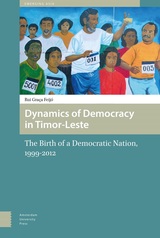

Born to a family of Russian intelligentsia in 1892 and coming of age in the crucible of revolution and war, Tsvetaeva has been seen as a victim of her politicized time, her life and her work marked by exile, neglect, and persecution. This book is the first to show us the poet as she discovered her life through art, shaped as much by inner demons as by the political forces and harsh realities of her day. With remarkable psychological and literary subtlety, Lily Feiler traces these demons through the tragic drama of Tsvetaeva’s life and poetry. Hers is a story full of contradictions, resisting social and literary conventions but enmeshed in the politics and poetry of her time. Feiler depicts the poet in her complex relation to her contemporaries—Pasternak, Rilke, Mayakovsky, Mandelstam, and Akhmatova. She shows us a woman embodying the values of nineteenth-century romanticism, yet radical in her poetry, supremely independent in her art, but desperate for appreciation and love, simultaneously mother and child in her complicated sexual relationships with men and women.
From prerevolutionary Russia to Red Moscow, from pre-World War II Berlin, Prague, and Paris to the Soviet Union under Stalin, Feiler follows the tortuous drama of Tsvetaeva’s life and work to its last tragic act, exposing at each turn the passions that molded some of this century’s most powerful poetry.


Between 1880 and 1930, close to 200 women were murdered by lynch mobs in the American South. Many more were tarred and feathered, burned, whipped, or raped. In this brutal world of white supremacist politics and patriarchy, a world violently divided by race, gender, and class, black and white women defended themselves and challenged the male power brokers. Crystal Feimster breaks new ground in her story of the racial politics of the postbellum South by focusing on the volatile issue of sexual violence.
Pairing the lives of two Southern women—Ida B. Wells, who fearlessly branded lynching a white tool of political terror against southern blacks, and Rebecca Latimer Felton, who urged white men to prove their manhood by lynching black men accused of raping white women—Feimster makes visible the ways in which black and white women sought protection and political power in the New South. While Wells was black and Felton was white, both were journalists, temperance women, suffragists, and anti-rape activists. By placing their concerns at the center of southern politics, Feimster illuminates a critical and novel aspect of southern racial and sexual dynamics. Despite being on opposite sides of the lynching question, both Wells and Felton sought protection from sexual violence and political empowerment for women.
Southern Horrors provides a startling view into the Jim Crow South where the precarious and subordinate position of women linked black and white anti-rape activists together in fragile political alliances. It is a story that reveals how the complex drama of political power, race, and sex played out in the lives of Southern women.


Making use of invaluable archival material, Feinberg's biographical account is followed by a study of Tabori's experimental theatre work. As did prominent avant-gardists such as Grotowski or Chaikin, Tabori sought to open up new vistas in an otherwise mainstream theatre system. Feinberg pays special attention to Tabori's theatrical innovations, most movingly found in his Holocaust plays. There Feinberg shows the ways in which Tabori's theatre becomes a locus of remembrance (Gedächtnisort) and of unique, engaging memory-work (Erinnerungsarbeit).
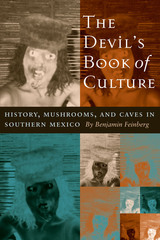
Since the 1950s, the Sierra Mazateca of Oaxaca, Mexico, has drawn a strange assortment of visitors and pilgrims—schoolteachers and government workers, North American and European spelunkers exploring the region's vast cave system, and counterculturalists from hippies (John Lennon and other celebrities supposedly among them) to New Age seekers, all chasing a firsthand experience of transcendence and otherness through the ingestion of psychedelic mushrooms "in context" with a Mazatec shaman. Over time, this steady incursion of the outside world has significantly influenced the Mazatec sense of identity, giving rise to an ongoing discourse about what it means to be "us" and "them."
In this highly original ethnography, Benjamin Feinberg investigates how different understandings of Mazatec identity and culture emerge through talk that circulates within and among various groups, including Mazatec-speaking businessmen, curers, peasants, intellectuals, anthropologists, bureaucrats, cavers, and mushroom-seeking tourists. Specifically, he traces how these groups express their sense of culture and identity through narratives about three nearby yet strange discursive "worlds"—the "magic world" of psychedelic mushrooms and shamanic practices, the underground world of caves and its associated folklore of supernatural beings and magical wealth, and the world of the past or the past/present relationship. Feinberg's research refutes the notion of a static Mazatec identity now changed by contact with the outside world, showing instead that identity forms at the intersection of multiple transnational discourses.
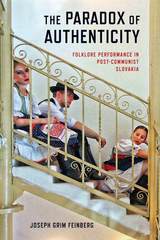
In Slovakia and elsewhere in Eastern Europe after World War II, Communist governments promoted folklore revivals and staged performances of song and dance as representations of "the people." When the Communists fell from power in Slovakia in 1989, folklore was also discredited in the eyes of many. By the early twenty-first century, however, a new generation launched a movement to revive folklore's reputation and reintroduce it to a broad public.
Weaving together personal narrative, ethnographic analysis, and philosophical reflection, Feinberg examines the aspirations and difficulties of young folk dance devotees as they recognize that authenticity is more easily prized than achieved. He sheds new light on the problems of specialized performance and broad participation, the uneasy relationship between folklore and the public sphere, and the paradoxical pursuit of authenticity in the modern world.
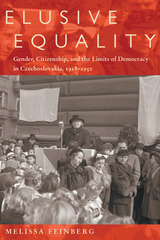
When Czechoslovakia became independent in 1918, Czechs embraced democracy, which they saw as particularly suited to their national interests. Politicians enthusiastically supported a constitution that proclaimed all citizens, women as well as men, legally equal. But they soon found themselves split over how to implement this pledge. Some believed democracy required extensive egalitarian legislation. Others contended that any commitment to equality had to bow before other social interests, such as preserving the traditional family.
On the eve of World War II, Czech leaders jettisoned the young republic for an “authoritarian democracy” that firmly placed their nation, and not the individual citizen, at the center of politics. In 1948, they turned to a Communist-led “people's democracy,” which also devalued individual rights.
By examining specific policy issues, including marriage and family law, civil service regulations, citizenship law, and abortion statutes, Elusive Equality demonstrates the relationship between Czechs' ideas about gender roles and their attitudes toward democracy. Gradually, many Czechs became convinced that protecting a traditionally gendered family ideal was more important to their national survival than adhering to constitutionally prescribed standards of equal citizenship. Through extensive original research, Melissa Feinberg assembles a compelling account of how early Czech progress in women's rights, tied to democratic reforms, eventually lost momentum in the face of political transformations and the separation of state and domestic issues. Moreover, Feinberg presents a prism through which our understanding of twentieth-century democracy is deepened, and a cautionary tale for all those who want to make democratic governments work.



Why teach about religion in public schools? What educational value can such courses potentially have for students?
In For the Civic Good, Walter Feinberg and Richard A. Layton offer an argument for the contribution of Bible and world religion electives. The authors argue that such courses can, if taught properly, promote an essential aim of public education: the construction of a civic public, where strangers engage with one another in building a common future. The humanities serve to awaken students to the significance of interpretive and analytic skills, and religion and Bible courses have the potential to add a reflective element to these skills. In so doing, students awaken to the fact of their own interpretive framework and how it influences their understanding of texts and practices. The argument of the book is developed by reports on the authors’ field research, a two-year period in which they observed religion courses taught in various public high schools throughout the country, from the “Bible Belt” to the suburban parkway. They document the problems in teaching religion courses in an educationally appropriate way, but also illustrate the argument for a humanities-based approach to religion by providing real classroom models of religion courses that advance the skills critical to the development of a civic public.


Anyone working in biodiversity conservation or field ecology should understand and utilize the common-sense process of scientific inquiry: observing surroundings, framing questions, answering those questions through well-designed studies, and, in many cases, applying results to decision making. Yet the interdisciplinary nature of conservation means that many workers are not well versed in the methods of science and may misunderstand or mistrust this indispensable tool.
Designing Field Studies for Biodiversity Conservation addresses that problem by offering a comprehensible, practical guide to using scientific inquiry in conservation work. In an engaging and accessible style, award-winning tropical ecologist and teacher Peter Feinsinger melds concepts, methods, and intellectual tools into a unique approach to answering environmental questions through field studies. Focusing on the fundamentals of common sense, independent thinking, and natural history, he considers:
- framing the question and designing the study
- interpreting and applying results through judicious use of statistical inference
- taking into account the natural history of plants, animals, and landscapes
- monitoring and assessing progress through approaches such as "bioindicator species" or "species diversity measures"
- helping other interested parties (park guards, local communities, school teachers) use scientific inquiry in addressing their own concerns
Detailed appendixes explain technical issues, while numerous sidebars and illustrations provide important background and thought-provoking exercises. Throughout, the author challenges the reader to integrate conceptual thinking with on-the-ground practice in order to make conservation truly effective. Feinsinger concentrates on examples from Latin America but stresses that the approach applies to local conservation concerns or field biology questions in any landscape.
Designing Field Studies for Biodiversity Conservation is an essential handbook for staff and researchers working with conservation institutions or projects worldwide, as well as for students and professionals in field ecology, wildlife biology, and related areas.

In Five Banners, Feinstein tells the inside history of Coach K’s forty-two-year career at Duke and the five NCAA championships, from the first against Kansas in 1991 to the most recent in 2015 against Wisconsin. With unparalleled access to Coach K, the team, and its staff, Feinstein takes readers on a mesmerizing ride into the locker room and onto the court. Full of intimate details, personal memories, and previously untold on- and off-court stories, it is a book that only Feinstein could write.
Feinstein explores a basketball legacy that begins with his days as an undergrad Duke Chronicle reporter covering coaches Bucky Waters and Neill McGeachy (who went 12-26 in one year as head coach), includes the “drought years” of the 1980s, the glory of the teams of the 1990’s, and moves into the present day with John Scheyer’s succession. Drawing on new interviews, Feinstein highlights the voices of Grant Hill, Nolan Smith, Christian Laettner, Tommy Amaker, and Bobby Hurley, who each bring new insights into the championship years.
Throughout, Feinstein unveils the momentous force of college basketball as a game of intense relationships and intimate conversations. Candid, revelatory, and engrossing, Five Banners is an essential book for all Duke fans and anyone who loves the college game.












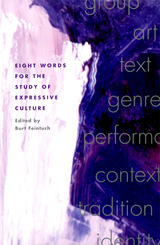
No matter where we are--in academic institutions, in cultural agencies, at home, or in a casual conversation--these are words we use when we talk about creative expression in its cultural contexts. Eight Words for the Study of Expressive Culture is a thoughtful, interdisciplinary examination of the keywords that are integral to the formulation of ideas about the diversity of human creativity, presented as a set of essays by leading folklorists.
Many of us use these eight words every day. We think with them. We teach with them. Much of contemporary scholarship rests on their meanings and implications. They form a significant part of a set of conversations extending through centuries of thought about creativity, meaning, beauty, local knowledge, values, and community. Their natural habitats range across scholarly disciplines from anthropology and folklore to literary and cultural studies and provide the framework for other fields of practice and performance as well.
Eight Words for the Study of Expressive Culture is a much-needed study of keywords that are frequently used but not easily explained. Anchored by Burt Feintuch’s cogent introduction, the book features essays by Dorothy Noyes, Gerald L. Pocius, Jeff Todd Titon, Trudier Harris, Deborah A. Kapchan, Mary Hufford, Henry Glassie, and Roger D. Abrahams.

Metropolitan Governance is the first book to bring together competing perspectives on the question and consequences of centralized vs. decentralized regional government. Presenting original contributions by some of the most notable names in the field of urban politics, this volume examines the organization of governments in metropolitan areas, and how that has an effect on both politics and policy.
Existing work on metropolitan governments debates the consequences of interjurisdictional competition, but neglects the role of cooperation in a decentralized system. Feiock and his contributors provide evidence that local governments successfully cooperate through a web of voluntary agreements and associations, and through collective choices of citizens. This kind of "institutional collective action" is the glue that holds institutionally fragmented communities together.
The theory of institutional collective action developed here illustrates the dynamics of decentralized governance and identifies the various ways governments cooperate and compete. Metropolitan Governance provides insight into the central role that municipal governments play in the governance of metropolitan areas. It explores the theory of institutional collective action through empirical studies of land use decisions, economic development, regional partnerships, school choice, morality issues, and boundary change—among other issues.
A one-of-a-kind, comprehensive analytical inquiry invaluable for students of political science, urban and regional planning, and public administration—as well as for scholars of urban affairs and urban politics and policymakers—Metropolitan Governance blazes new territory in the urban landscape.

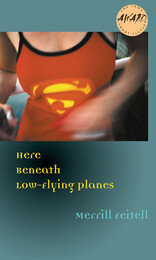
The stories in Merrill Feitell’s award-winning collection, Here Beneath Low-Flying Planes, examine the fleeting and unexpected moments of human connection, reminding us of the indelible impact we have on one another no matter how insignificant or anonymous we might feel under our huge, collective sky.
Feitell’s characters deal with shifting dynamics in relationships—whether they be best friends, lovers, family, or even strangers—that consistently leave them torn between two places or commitments. In the title story, Janie has undergone a painful childbirth experience and her group of friends must pioneer new dynamics while she wonders how to bring her old self back. In “Bike New York!” amid thirty thousand cyclists, a man on the brink of marriage meets a young girl who, in a tiny Brooklyn bakery, affirms both who he has been and who he is going to be. On this short detour from normal life he comes to understand “the funny thing about finding your way in the world. There was a place laid out for you . . . and even as you stepped into it, happy for the chance to rest, you wondered how you ever ended up there.”
Funny, big-hearted, and deft, Here Beneath Low-Flying Planes navigates the reader through the life that happens when you’re planning other things. It is a collection of experiences, roads not taken, and the intense and unforeseen sparks of connection we hope for.

The career of writer John Edgar Wideman has been the sort of success story on which America prides itself. Coming from an inner-city African American neighborhood, he studied at the Universities of Pennsylvania and Oxford; published his first novel at age twenty-six; won two PEN/Faulkner Awards, as well as a MacArthur “genius grant”; and has held several top teaching posts. But profound tragedy has also marked his life: both his brother and son received life sentences for murder, and a nephew was killed at home after a bar fight. His life thus illustrates how the strictures of “race” temper American notions of freedom and opportunity.
Wideman’s engagement with race and identity has been nuanced and complex, taking the form of what Michel Feith sees as a critical dialogue with modernity–a moment in history which gave birth not only to the Enlightenment but also to American slavery and the conundrum of “race.” Feith argues that the key work in the Wideman oeuvre is The Cattle Killing (1996), his only “historical novel,” whose threads include the 1793 yellow fever epidemic in Philadelphia, the 1856–57 Cattle Killing prophecy, which wreaked havoc among the Xhosa tribe of South Africa, and the contemporary situation of black ghettos in the United States. Unfolding within the early days of the American Republic, the novel offers a window through which all of Wideman’s works and their central concerns—ghettoization, imprisonment, familial relationships, emancipation, and the diasporic sense of history—can be understood.
With clarity and theoretical sophistication, Feith offers provocative new readings of Wideman’s texts, from the “Homewood” books based on his youth in Pittsburgh to his haunting memoir Brothers and Keepers. In the “postmodern” era, Feith suggests, critics of modernity are not in short supply, but few have the depth, rigor, and thoughtfulness of John Edgar Wideman.


The Structural Allegory was first published in 1984. Minnesota Archive Editions uses digital technology to make long-unavailable books once again accessible, and are published unaltered from the original University of Minnesota Press editions.
The radical questions raised by Saussure, Barthes, Foucault, Levi-Strauss, and others have had an enormous impact on Anglo-American literary and cultural studies over the past twenty years. John Fekete argues that we can see this strategic development of French thought in terms of what he calls "the structural allegory." Structuralism proper has given way to the currently dominant model of post-structuralism, yet we remain uncertain of the practical orientations favored by thinkers associated with both phases of the movement.
With the aim of uncovering the legacy of the structural tradition, the essays in this volume survey key French thinkers, including some not well known in the Anglo-American context — Baudrillard and Castoriadis. The essays are reconstructive, not deconstructive, in character, scholarly in method, and ecumenical in spirit. While the structural allegory emerges from this critical analysis as an inescapable intellectual paradigm (analogous to the transformations in quantum physics and modern biology), the authors argue that it merits admiration and reservation in equal measure.

Liz Fekete is a leading authority on issues of racism, Islamophobia and national security legislation. A Suitable Enemy draws on sixteen years of research to present a comprehensive overview of EU immigration, asylum, race and security policies.
Fekete argues that at the same time as the EU introduces selective migration policies, it closes its borders against asylum seekers who were the first victims of the growth of the security state which now embraces Muslims. She explores the way in which anti-terrorist legislation has been used to evict undesirable migrants, how deportation policies commodify and de-humanise the most vulnerable and how these go hand in hand with evolving forms of racism, particularly Islamophobia.
At the heart of the book is an examination of xeno-racism -- a non-colour coded form of institutionalised racism -- where migrants who do not assimilate, or who are believed to be incapable of assimilation, are excluded.

* explain eye anatomy and how healthy eyes work
* describe various eye diseases, including pink eye, cataract, glaucoma, age-related macular degeneration, and diabetic retinopathy
* provide up-to-date information on surgery
For each eye problem, the authors describe in simple, straightforward language:
* what it is
* the symptoms
* what, if anything, you can do to prevent it
* when to call the doctor
* diagnostic tests and treatment
* the likelihood of recovery
All about Your Eyes includes a glossary of technical terms and, following each entry, links to websites where further information may be found.
Contributors. Natalie A. Afshari, MD, Rosanna P. Bahadur, MD, Paramjit K. Bhullar, MD, Faith A. Birnbaum, MD, Cassandra C. Brooks, MD, Pratap Challa, MD, Melissa Mei-Hsia Chan, MBBS, Ravi Chandrashekhar, MD, MSEE, Nathan Cheung, OD, FAAO Claudia S. Cohen, MD, Vincent A. Deramo, MD, Cathy DiBernardo, RN, Laura B. Enyedi, MD, Sharon Fekrat, MD, Henry L. Feng, MD, Brenton D. Finklea, MD, Anna Ginter, MD, Tanya S. Glaser, MD, Michelle Sy Go, MD, MS, Mark Goerlitz-Jessen, MD, Herb Greenman, MD, Abhilash Guduru, MD, Preeya Gupta, MD, Renee Halberg, MSW, LCSW, S. Tammy Hsu, MD, Alessandro Iannaccone, MD, MS, FARVO, Charlene L. James, OD, Kim Jiramongkolchai, MD, Michael P. Kelly, FOPS, Muge R. Kesen, MD, Kirin Khan, MD, Wajiha Jurdi Kheir, MD, Jane S. Kim, MD, Jennifer Lira, MD, Katy C. Liu, MD, PhD, Ramiro S. Maldonado, MD, Ankur Mehra, MD, Priyatham S. Mettu, MD, Prithvi Mruthyunjaya, MD, MHS, Nisha Mukherjee, MD, Kenneth Neufeld, MD, Kristen Peterson, MD, James H. Powers, MD, S. Grace Prakalapakorn, MD, MPH, Michael Quist, MD, Leon Rafailov, MD, Roshni Ranjit-Reeves, MD, Nikolas Raufi, MD, William Raynor, BS, Cason Robbins, BS, Ananth Sastry, MD, Dianna L. Seldomridge, MD, MBA, Terry Semchyshyn, MD, Ann Shue, MD, Julia Song, MD, Brian Stagg, MD, Christopher Sun, MBBS, Anthony Therattil, BS, Daniel S.W. Ting, MBBS, Fay Jobe Tripp, MS, OTR/L, CLVT, CDRS, Obinna Umunakwe, MD, PhD, Lejla Vajzovic, MD, Susan M. Wakil, MD, C. Ellis Wisely, MD, MBA, Julie A. Woodward, MD

In this reliable guide, leading eye care experts:
—explain how healthy eyes work
—describe various eye diseases, including pink eye, cataract, glaucoma, age-related macular degeneration, and diabetic retinopathy
—provide up-to-date information on eye surgery, including refractive, laser, and cosmetic
For each eye problem, the authors describe in simple, straightforward language
—what it is
—the symptoms
—what, if anything, you can do to prevent it
—when to call the doctor
—the treatment
—the likelihood of recovery
All about Your Eyes includes a glossary of technical terms and, following each entry, links to web sites where further information may be found.

Felak opens by providing a background on pre-war and wartime Slovak politics, notably the rise of Slovak Catholic nationalism and Slovakia's alignment with Nazi Germany during World War II. He then describes the union formed in the famed “April Agreement” of 1946 between the Democratic Party and Catholics that guaranteed a landslide victory for the Democrats and insured a position for Catholics in the new regime. Felak views other major political events of the period, including: the 1947 Czechoslovak war crimes trial of Father Jozef Tiso; education policy; the treatment of the Hungarian minority; the trumped-up “anti-state conspiracy” movement led by police in the Fall of 1947; and the subsequent Communist putsch.
Through extensive research in Slovak national archives, including those of the Democratic and Communist parties, After Hitler, Before Stalin assembles a comprehensive study of the predominant political forces and events of this tumultuous period and the complex motivations behind them.
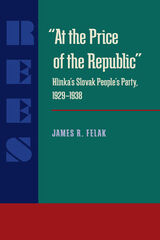
Slovak nationalist sentiment has been a constant presence in the history of Czechoslovakia, coming to head in the torrent of nationalism that resulted in the dissolution of the Republic on January 1, 1993. James Felak examines a parallel episode in the 1930s with Slovak nationalists achieved autonomy for Slovakia-but “at the price” of the loss of East Central Europe's only parliamentary democracy and the strengthening of Nazi power.
The tensions between Czechs and Slovaks date back to the creation of Czechoslovakia in 1918. Slovaks, who differed sharply in political tradition, social and economic development, and culture, and resented being governed by a centralized administration run from the Czech capital of Prague, formed the Slovak People's Party, led by Roman Catholic priest Ankrej Hlinka. Drawing heavily on Czech and Slovak archives, Felak provides a balanced history of the party, offering unprecedented insight into intraparty factionalism and behind-the-scenes maneuvering surrounding SSP's policy decisions.
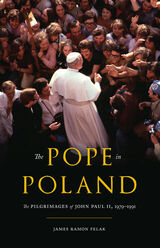
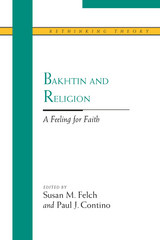
These essays provide an overview of Bakhtin's attitude toward religion in general and Russian Orthodoxy in particular, addressing topics ranging from how Bakhtin's religious ideas informed his linguistic and aesthetic theories to the idea of love in his secular and religious thought and to the religious component of Bakhtin's theory of laughter.

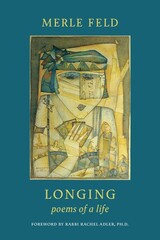
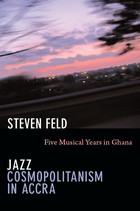
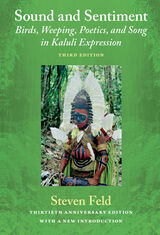

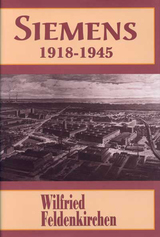

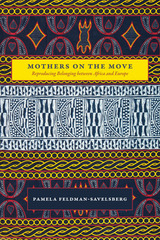
Feldman-Savelsberg introduces readers to several Cameroonian mothers, each with her own unique history, concerns, and voice. Through scenes of their lives—at a hometown association’s year-end party, a celebration for a new baby, a visit to the Foreigners’ Office, and many others—as well as the stories they tell one another, Feldman-Savelsberg enlivens our thinking about migrants’ lives and the networks and repertoires that they draw on to find stability and, ultimately, belonging. Placing women’s individual voices within international social contexts, this book unveils new, intimate links between the geographical and the generational as they intersect in the dreams, frustrations, uncertainties, and resolve of strong women holding families together across continents.
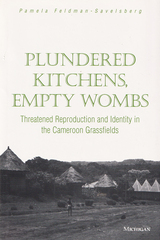
In the Cameroon grassfields, an area of high fertility, women hold a paradoxical fear of infertility. By combining symbolic, political-economic, and historical analyses, Pamela Feldman-Savelsberg traces the way reproductive threat is invoked in struggles over gender and ethnic identities. Women's fears of reproductive disorders, she finds, are an important mode of expression for their worries about much larger issues, such as rural poverty, brought about or exacerbated by political and economic changes in this century.
A lively case study of an infertile queen who flees the palace sets the stage for discussions of the ethnographic and historical setting, the symbolism of fertility and infertility, and the development and interaction of cosmopolitan and ethno-gynecologies. The book concludes with an analysis of the links between women's role in human reproduction and the divine king's role in social reproduction, both occurring in the rapidly changing context of a multiethnic African nation.
Plundered Kitchens, Empty Wombs underscores the relevance of medical anthropology to other anthropological specializations, as well as to epidemiologists, population specialists, and development planners. It should reach a broad audience in medical anthropology, public health, and women's studies.
Pamela Feldman-Savelsberg is Assistant Professor of Anthropology, Carleton College.

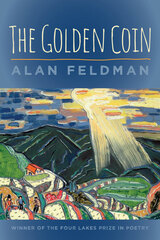
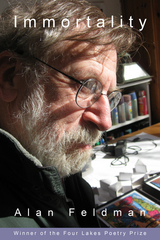
In a collection where the dead do speak, Feldman’s poems in his first segment, “Self-Portraits,” are more likely to be about others than about himself. The segment “Partners” reflects on marriage and divorce, the latter an “uncontested victor over marriage, / the way the flood is champion over the flood plain.” In the section “Offshore” Feldman writes about travel to Uruguay, his impractical love of sailing, and his wonder at Walter Cronkite’s obtuseness about Vietnam. In his final segment, “What Now?,” he asks about meaning itself. Babysitting his tiny granddaughter, he thinks of sailing—hours of boredom punctuated by moments of terror—and wonders if even this suggests something world-encompassing he’s “still hoping to find a name for. / If it isn’t joy.”
Winner of the Mass Book Award for Poetry, Massachusetts Center for the Book
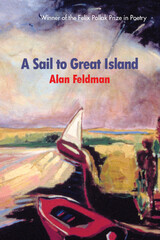

Through compelling personal accounts and family correspondence, One Step Ahead documents Alfred Feldman’s harrowing flight into exile as he and his family fled the pogroms that flooded across Nazi-occupied Europe. It is a memoir of horror and hope recounted by a man who survived the organized terror of Hitler’s "Final Solution" as it destroyed entire generations of European Jewish life within ten catastrophic years in the mid-twentieth century. Feldman’s memoir conveys the searing pain that has never left him, while demonstrating the triumphant humanity of a survivor.
Feldman vividly describes the impact of the escalating anti-Semitic hatred and violence in Germany during the 1930s, the impact of the notorious Nuremberg Laws in 1935, and the terrifying Kristallnacht pogrom in 1938. By age sixteen, Feldman was living with his parents and three younger sisters in Antwerp, Belgium, during the 1939 German invasions of Poland, marking the start of World War II. In the face of increasing persecution, Feldman’s extended family scattered over the globe in a desperate attempt to remain one step ahead of their Nazi pursuers.
Recalling his life on the run, Feldman describes what few survivors have chosen to write about: the Vichy raids of August 26, 1942; the French labor brigades; the Comité Dubouchage; and life in super-vised residence in France under the Italians. While in the south of France, Feldman endured food shortages and Nazi anti-Semitic measures, beginning with work camps and culminating in the deportation and ultimate death of his mother and sisters at Auschwitz.
To evade the Germans, Feldman and his father fled into the Italian Alps in September of 1943, hiding between the Allies and the Germans. Aided by local villagers, the Feldmans survived precariously for over a year and a half, along with other Jewish refugees, until that region was liberated. Only then, and only gradually, did Feldman manage to piece together the fate of his surviving family and learn at last of the death of his mother and sisters.
Now, as an adult, Alfred Feldman has retraced his escape and exile, taking his wife and children to his hometown in Germany, the mountains in Italy, and Montagnac, where a plaque commemorates his mother and sisters.
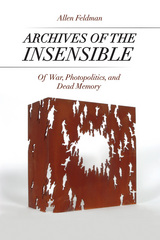
Excavating a scenography of trials—formal or covert, orchestrated or improvised, criminalizing or criminal—Feldman shows how the will to truth disappears into the very violence it interrogates. He maps the sensory inscriptions and erasures of war, highlighting war as a media that severs factuality from actuality to render violence just. He proposes that war promotes an anesthesiology that interdicts the witness of a sensory and affective commons that has the capacity to speak truth to war. Feldman uses layered deconstructive description to decelerate the ballistical tempo of war to salvage the embodied actualities and material histories that war reduces to the ashes of collateral damage, the automatism of drones, and the opacities of black sites. The result is a penetrating work that marries critical visual theory, political philosophy, anthropology, and media archeology into a trenchant dissection of emerging forms of sovereignty and state power that war now makes possible.
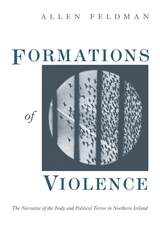
"A sophisticated and persuasive late-modernist political analysis that consistently draws the reader into the narratives of the author and those of the people of violence in Northern Ireland to whom he talked. . . . Simply put, this book is a feast for the intellect"—Thomas M. Wilson, American Anthropologist
"One of the best books to have been written on Northern Ireland. . . . A highly imagination and significant book. Formations of Violence is an important addition to the literature on political violence."—David E. Schmitt, American Political Science Review

Focusing primarily on the Catholic doctrinal view of the Jews and its ramifications, Egal Feldman traces the historicalroots of anti-Semitism, examining tenacious Catholic beliefsincluding the idea that the Jews lost their place as the chosen people with the coming of Christianity, deicide, and the conviction that their purported responsibility for the Crucifixion justified subsequent Jewish misery.
A new era of Catholic-Jewish relations opened in 1962 with Vatican II’s Declaration on the Jews, reversing the theology of contempt. Feldman explores the strides made in improving relations, such as the Vatican’s diplomatic recognition of the Jewish state, as well as a number of recent issues.
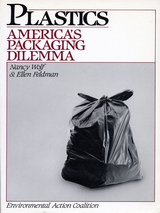
Plastics explains what plastics are, how they are made, how they are used, and the problems and opportunities they bring.
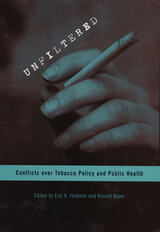
Tobacco, among the most popular consumer products of the twentieth century, is under attack. Once a behavior that knew no social bounds, cigarette smoking has been transformed into an activity that reflects sharp differences in social status.
Unfiltered tells the story of how anti-smoking advocates, public health professionals, bureaucrats, and tobacco corporations have clashed over smoking regulation. The nations discussed in this book--Australia, Canada, Denmark, France, Germany, Japan, the United Kingdom, and the United States--restrict tobacco advertising, tax tobacco products, and limit where smoking is permitted. Each is also struggling to shape a tobacco policy that ensures corporate accountability, protects individual liberty, and asserts the state's public health power.
Unfiltered offers a comparative perspective on legal, political, and social conflicts over tobacco control. The book makes a unique contribution to our understanding of how scientific evidence, global health advocacy, individual risk assessments, and governmental interests intersect in the crafting of tobacco policy. It features national case studies and cross-cultural essays by experts in health policy, law, political science, history, and sociology. The lessons in Unfiltered are crucial to all who seek to understand and influence tobacco policy and reduce tobacco-related mortality worldwide.
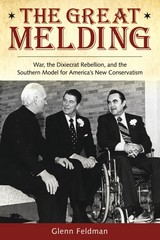
Audacious in its scope, subtle in its analysis, and persuasive in its arguments, The Great Melding is the second book in Glenn Feldman’s magisterial recounting of the South’s transformation from a Reconstruction-era citadel of Democratic Party inertia to a cauldron of GOP agitation. In this pioneering study, Feldman shows how the transitional years after World War II, the Dixiecrat episode, and the early 1950s formed a pivotal sequence of events that altered America’s political landscape in profound, fundamental, and unexpected ways.
Feldman’s landmark work The Irony of the Solid South dismantled the myth of the New Deal consensus, proving it to be only a fleeting alliance of fissiparous factions; The Great Melding further examines how the South broke away from that consensus. Exploring issues of race and white supremacy, Feldman documents and explains the roles of economics, religion, and emotive appeals to patriotism in southern voting patterns. His probing and original analysis includes a discussion of the limits of southern liberalism and a fresh examination of the Dixiecrat Revolt of 1948.
Feldman convincingly argues that the Dixiecrats—often dismissed as a transitory footnote in American politics—served as a template for the modern conservative movement. Now a predictable Republican stronghold, Alabama at the time was viewed by national political strategists as a battleground and bellwether. Masterfully synthesizing a vast range of sources, Feldman shows that Alabama was then one of the few states where voters made unpredictable choices between the competing ideologies of the Democrats, Republicans, and Dixiecrats.
Writing in his lively and provocative style, Feldman demonstrates that the events he recounts in Alabama between 1942 and Dwight Eisenhower’s 1952 election encapsulate a rare moment of fluidity in American politics, one in which the New Deal consensus shattered and the Democratic and Republican parties fought off a third-party revolt only to find themselves irrevocably altered by their success. The Great Melding will fascinate historians, political scientists, political strategists, and readers of political nonfiction.
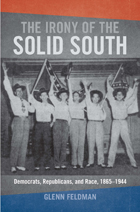
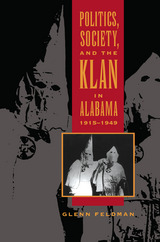
exhaustive research that challenges traditional interpretations.
The Ku Klux Klan has wielded considerable power both as
a terrorist group and as a political force. Usually viewed as appearing
in distinct incarnations, the Klans of the 20th century are now shown by
Glenn Feldman to have a greater degree of continuity than has been previously
suspected. Victims of Klan terrorism continued to be aliens, foreigners,
or outsiders in Alabama: the freed slave during Reconstruction, the 1920s
Catholic or Jew, the 1930s labor organizer or Communist, and the returning
black veteran of World War II were all considered a threat to the dominant
white culture.
Feldman offers new insights into this "qualified continuity"
among Klans of different eras, showing that the group remained active during
the 1930s and 1940s when it was presumed dormant, with elements of the
"Reconstruction syndrome" carrying over to the smaller Klan of the civil
rights era.
In addition, Feldman takes a critical look at opposition to
Klan activities by southern elites. He particularly shows how opponents
during the Great Depression and war years saw the Klan as an impediment
to attracting outside capital and federal relief or as a magnet for federal
action that would jeopardize traditional forms of racial and social control.
Other critics voiced concerns about negative national publicity, and others
deplored the violence and terrorism.
This in-depth examination of the Klan
in a single state, which features rare photographs, provides a means of
understanding the order's development throughout the South. Feldman's book
represents definitive research into the history of the Klan and makes a
major contribution to our understanding of both that organization and the
history of Alabama.
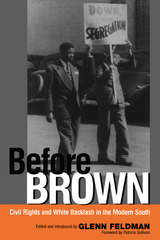
Details the ferment in civil rights that took place across the South before the momentous Brown vs. Board of Education decision in 1954
This collection refutes the notion that the movement began with the Supreme Court decision, and suggests, rather, that the movement originated in the 1930s and earlier, spurred by the Great Depression and, later, World War II—events that would radically shape the course of politics in the South and the nation into the next century.
This work explores the growth of the movement through its various manifestations—the activities of politicians, civil rights leaders, religious figures, labor unionists, and grass-roots activists—throughout the 1940s and 1950s. It discusses the critical leadership roles played by women and offers a new perspective on the relationship between the NAACP and the Communist Party.
Before Brown shows clearly that, as the drive toward racial equality advanced and national political attitudes shifted, the validity of white supremacy came increasingly into question. Institutionalized racism in the South had always offered white citizens material advantages by preserving their economic superiority and making them feel part of a privileged class. When these rewards were threatened by the civil rights movement, a white backlash occurred.

This collection of essays examines the contributions of some of the most notable interpreters of southern history and culture, furthering our understanding of the best historical work produced on the region.
Historian Glenn Feldman gathers together a group of essays that examine the efforts of important scholars to discuss and define the South's distinctiveness. The volume includes 18 chapters on such notable historians as John Hope Franklin, Anne Firor Scott, Frank L. Owsley, W. J. Cash, and C. Vann Woodward, written by 19 different researchers, both senior historians and emerging scholars, including Jacquelyn Dowd Hall, John Shelton Reed, Bruce Clayton, and Ted Ownby. The essays examine the major work or works of each scholar under consideration as well as that scholar's overall contribution to the study of southern history.
Reading Southern History will enlighten readers on the more compelling themes currently and traditionally explored by southern historians. It will appeal greatly to professors and students as a valuable multidisciplinary introduction to the study of southern history, since several of the essays are on scholars who are working outside the discipline of history proper, in the fields of political science, sociology, journalism, and economics. Feldman's collection, therefore, sheds light on a broad spectrum of themes important in southern history, including the plight of poor whites, race, debates over race and class, the "reconstruction syndrome," continuity versus discontinuity in relation to blacks and whites, and regional culture and distinctiveness.
Reading Southern History will be valuable to students and scholars of women's studies, African American history, working-class history, and ethnic studies, as well as traditional southern history. Most important, the publication makes a significant contribution to the development and ongoing study of the historiography of the South.
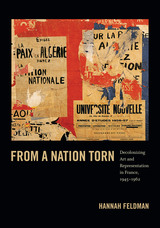
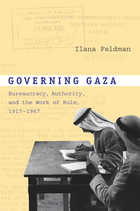
Drawing on archival research in Gaza, Cairo, Jerusalem, and London, as well as two years of ethnographic research with retired civil servants in Gaza, Feldman identifies two distinct, and in some ways contradictory, governing practices. She illuminates mechanisms of “reiterative authority” derived from the minutiae of daily bureaucratic practice, such as the repetitions of filing procedures, the accumulation of documents, and the habits of civil servants. Looking at the provision of services, she highlights the practice of “tactical government,” a deliberately restricted mode of rule that makes limited claims about governmental capacity, shifting in response to crisis and operating without long-term planning. This practice made it possible for government to proceed without claiming legitimacy: by holding the question of legitimacy in abeyance. Feldman shows that Gaza’s governments were able to manage under, though not to control, the difficult conditions in Gaza by deploying both the regularity of everyday bureaucracy and the exceptionality of tactical practice.

The editors argue that ideas about humanity find concrete expression in the governing work that operationalizes those ideas to produce order, prosperity, and security. As a site of governance, humanity appears as both an object of care and a source of anxiety. Assertions that humanity is being threatened, whether by environmental catastrophe or political upheaval, provide a justification for the elaboration of new governing techniques. At the same time, humanity itself is identified as a threat (to nature, to nation, to global peace) which governance must contain. These apparently contradictory understandings of the relation of threat to the category of humanity coexist and remain in tension, helping to maintain the dynamic co-production of governance and humanity.
Contributors. Arun Agrawal, Joao Biehl , Didier Fassin, Allen Feldman, Ilana Feldman, Rebecca Hardin, S. Lochann Jain, Liisa Malkki, Adriana Petryna, Miriam Ticktin, Richard Ashby Wilson, Charles Zerner

In Rethinking Community from Peru, Irina Alexandra Feldman examines the deep political connotations and current relevance of Arguedas’s fiction to the Andean region. Looking principally to his most ambitious and controversial work, All the Bloods, Feldman analyzes Arguedas’s conceptions of community, political subjectivity, sovereignty, juridical norm, popular actions, and revolutionary change. She deconstructs his particular use of language, a mix of Quechua and Spanish, as a vehicle to express the political dualities in the Andes. As Feldman shows, Arguedas’s characters become ideological speakers and the narrator’s voice is often absent, allowing for multiple viewpoints and a powerful realism. Feldman examines Arguedas’s other novels to augment her theorizations, and grounds her analysis in a dialogue with political philosophers Walter Benjamin, Jean-Luc Nancy, Carl Schmitt, Jacques Derrida, Ernesto Laclau, and Álvaro García-Linera, among others.
In the current political climate, Feldman views the promise of Arguedas’s vision in light of Evo Morales’s election and the Bolivian plurality project recognizing indigenous autonomy. She juxtaposes the Bolivian situation with that of Peru, where comparatively limited progress has been made towards constitutional recognition of the indigenous groups. As Feldman demonstrates, the prophetic relevance of Arguedas’s constructs lie in their recognition of the sovereignty of all ethnic groups and their coexistence in the modern democratic nation-state, in a system of heterogeneity through autonomy—not homogeneity through suppression. Tragically for Arguedas, it was a philosophy he could not reconcile with the politics of his day, or from his position within Peruvian society.

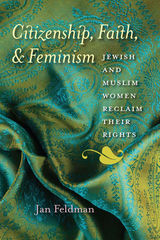
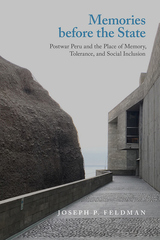
Memories before the State examines the discussions and debates surrounding the creation of the Place of Memory, Tolerance, and Social Inclusion (LUM), a national museum in Peru that memorializes the country’s internal armed conflict of the 1980s and 1990s. Emerging from a German donation that the Peruvian government initially rejected, the Lima-based museum project experienced delays, leadership changes, and limited institutional support as planners and staff devised strategies that aligned the LUM with a new class of globalized memorial museums and responded to political realities of the country’s postwar landscape. The book analyzes forms of authority that emerge as an official institution seeks to incorporate and manage diverse perspectives on recent violence.

Hobbes's Leviathan, Hegel's Phenomenology of Spirit, and Heidegger's Being and Time dramatize conscience's relation to language and knowledge, morality and duty, and ontology. Feldman investigates how, within these works, conscience is described as binding upon us while at the same time asking how texts themselves may be read as binding.
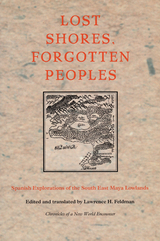
In these narratives—primary documents written by missionaries and conquistadors—vivid details of these little known Mayan cultures are revealed, answering how and why lowlanders were able to evade Spanish conquest while similar civilizations could not. Fascinating tales of the journey from Europe are included, involving unknown islands, lost pilots, life aboard a galleon fleet, political intrigue, cannibals, and breathtaking natural beauty. In short, these forgotten manuscripts—translations of the papers of the past—provide an unforgettable look at an understudied chapter in the age of exploration.
Lost Shores, Forgotten Peoples will appeal to archaeologists, anthropologists, and historians interested in Central America, the Maya, and the Spanish Conquest.
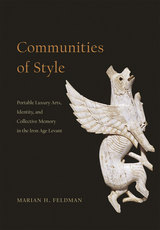
Marian H. Feldman brings her dual training as an art historian and an archaeologist to bear on the networks that were essential to the movement and trade of luxury goods—particularly ivories and metal works—and how they were also central to community formation. The interest in, and relationships to, these art objects, Feldman shows, led to wide-ranging interactions and transformations both within and between communities. Ultimately, she argues, the production and movement of luxury goods in the period demands a rethinking of our very geo-cultural conception of the Levant, as well as its influence beyond what have traditionally been thought of as its borders.
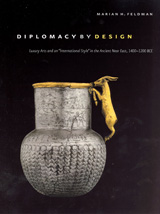
Marian Feldman's Diplomacy by Design examines the profound connection between art produced during this period and its social context, revealing inanimate objects as catalysts—or even participants—in human dynamics. Feldman's fascinating study shows the ways in which the exchange of these works of art actively mediated and strengthened political relations, intercultural interactions, and economic negotiations. Previous studies of this international style have focused almost exclusively on stylistic attribution at the expense of social contextualization. Written by a specialist in ancient Near Eastern art and archaeology who has excavated and traveled extensively in this area of the world, Diplomacy by Design provides a much broader consideration of the symbolic power of material culture and its centrality in the construction of human relations.
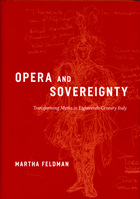
Taking an anthropological approach to European music that’s as bold as it is unusual, Martha Feldman traces Italian opera’s shift from a mythical assertion of sovereignty, with its festive forms and rituals, to a dramatic vehicle that increasingly questioned absolute ideals. She situates these transformations against the backdrop of eighteenth-century Italian culture to show how opera seria both reflected and affected the struggles of rulers to maintain sovereignty in the face of a growing public sphere. In so doing, Feldman explains why the form had such great international success and how audience experiences of the period differed from ours today. Ambitiously interdisciplinary, Opera and Sovereignty will appeal not only to scholars of music and anthropology, but also to those interested in theater, dance, and the history of the Enlightenment.
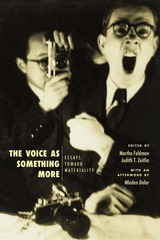
Using Mladen Dolar’s influential A Voice and Nothing More as a reference point, The Voice as Something More reorients Dolar’s psychoanalytic analysis around the material dimensions of voices—their physicality and timbre, the fleshiness of their mechanisms, the veils that hide them, and the devices that enhance and distort them. Throughout, the essays put the body back in voice. Ending with a new essay by Dolar that offers reflections on these vocal aesthetics and paradoxes, this authoritative, multidisciplinary collection, ranging from Europe and the Americas to East Asia, from classics and music to film and literature, will serve as an essential entry point for scholars and students who are thinking toward materiality.
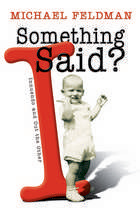
What we have here is another mighty slim volume from Michael Feldman, best known (when known at all) for his public radio show "Whad'ya Know" (sic). Feldman, who spouts off about things he knows "not much" about weekly, here writes them down:
· how to get your own radio show and what you can do with it once you do
· paranoia
· marriage (or as Feldman likes to refer to it, "a long-term bad relationship")
· Hitler
· SUVs
· child-rearing (although it sounds like it's the author who is being reared)
· a number of short pieces on places he and his crew have visited for their "remote possibilities"
· more references to "gentiles" than absolutely necessary (seems to be an issue for Feldman, although he is tickled with the
notion that, to a Mormon, he is one)
· some attempts to misrepresent scientific or social research for humorous purposes
· many personal revelations that prove the examined life is not necessarily worth living either
· and pages and pages of fluff.
Mr. Feldman has not been compared, to our knowledge, to S. J. Perlman.
But here is some of what Michael Feldman says in Something I Said:
"The paranoid no longer is: paranoia has outlived its usefulness when everybody is out to get us."
"Take the phrase 'no problem': I can use it, although it is the very opposite of my two-word world view ('Nothing works')."
"Whatever latitude beauty may have in the eye of the beholder, funny is not readily apparent to all, and, who knows, they may be right. More importantly, they may be bigger."
Includes a music CD by Michael Feldman and John Sieger.
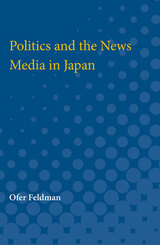
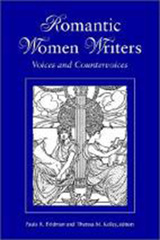


"A richly detailed, well-crafted portrait of a cross section of autoworkers in the midst of an identity crisis and a crisis gripping the U.S. auto industry."--Frank Hammer, President, United Auto Workers Local 909
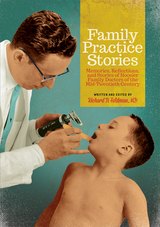

Scientific and technological innovations are forcing patent law into the spotlight and revealing its many glaring inadequacies. Take, for example, the patent case that almost shut down the BlackBerry, or the growing phenomenon of patent trolling, in which patents are acquired for the sole purpose of entrapping companies whose products relate to them. And patents on genes have everyone up in arms—and our courts confused.
Robin Feldman explains why patents are causing so much trouble. The problem lies in our assumption that patents set clear boundaries for rights to an invention. In reality, they do no such thing. The very nature of inventions makes them impossible to describe unambiguously for all time. When something is so new that we do not understand yet how it works, what it is capable of doing, or how it could be applied—as is often the case in biotechnology—description is necessarily slippery.
Instead of hoping for clear boundaries, and moaning when we don’t get them, Rethinking Patent Law urges lawmakers to focus on what the law can do well: craft rules that anticipate the bargaining that will occur as rights unfold. By steering clear of laws that distort the bargaining process, lawmakers can help courts answer difficult questions, such as whether genes, software, and business methods constitute patentable subject matter, whether patents in the life sciences should control inventions that have yet to be discovered, and how to resolve the battles between pharmaceutical companies and generics.

Adolescents embody the best hopes of American society. Their vital role in shaping our future lends particular significance to their success in negotiating the passage from childhood to adulthood, while their intensity and visibility often make them barometers of social change. It is all the more remarkable, then, that this critical period has only recently captured the full attention of researchers.
At the Threshold presents the long-awaited findings of the Carnegie Foundation study on adolescence. It offers a comprehensive overview of what investigators are learning about normal development and provides an interdisciplinary synthesis of research into the biological, social, and psychological changes occurring during this key stage in the life span. While focusing on the contexts of adolescent life—social and ethnic, family and school, leisure and work—it also addresses how researchers are doing in the effort to understand the intersection of processes that initiate and sustain adolescent development and to characterize the extraordinary changes that occur during these years.
Contrary to popular belief, large numbers of young people continue to mature into productive members of society. At the Threshold seeks to allow professionals and nonprofessionals alike important access to the reality of normal adolescent experience. The authors recognize that only if we begin to understand and clearly articulate the parameters of successful adolescent development can we hope to intervene with those individuals whose lives seem aimed toward unsatisfactory futures.

Drawing on the most comprehensive survey of public reactions to the war, Stanley Feldman, Leonie Huddy, and George E. Marcus revisit this critical period and come back with a very different story. Polling data from that critical period shows that the Bush administration’s carefully orchestrated campaign not only failed to raise Republican support for the war but, surprisingly, led Democrats and political independents to increasingly oppose the war at odds with most prominent Democratic leaders. More importantly, the research shows that what constitutes the news matters. People who read the newspaper were more likely to reject the claims coming out of Washington because they were exposed to the sort of high-quality investigative journalism still being written at traditional newspapers. That was not the case for those who got their news from television. Making a case for the crucial role of a press that lives up to the best norms and practices of print journalism, the book lays bare what is at stake for the functioning of democracy—especially in times of crisis—as newspapers increasingly become an endangered species.
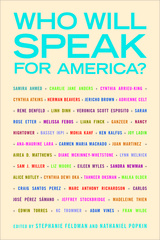
The editors and contributors to Who Will Speak for America? are passionate and justifiably angry voices providing a literary response to today’s political crisis. Inspired by and drawing from the work of writers who participated in nationwide Writers Resist events in January 2017, this volume provides a collection of poems, stories, essays, and cartoons that wrestle with the meaning of America and American identity. The contributions—from established figures including Eileen Myles, Melissa Febos, Jericho Brown, and Madeleine Thien, as well as rising new voices, such as Carmen Maria Machado, Ganzeer, and Liana Finck—confront a country beset by racial injustice, poverty, misogyny, and violence.
Contributions reflect on the terror of the first days after the 2016 Presidential election, but range well beyond it to interrogate the past and imagine possible American futures.
Who Will Speak for America? inspires readers by emphasizing the power of patience, organizing, resilience and community. These moving works advance the conversation the American colonists began, and that generations of activists, in their efforts to perfect our union, have elevated and amplified.
All royalties will benefit the Southern Poverty Law Center.
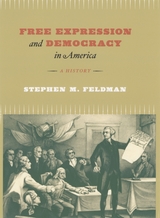
Charting the course of free expression alongside the nation’s political evolution, from the birth of the Constitution to the quagmire of the Vietnam War, Stephen M. Feldman argues that our level of freedom is determined not only by the Supreme Court, but also by cultural, social, and economic forces. Along the way, he pinpoints the struggles of excluded groups—women, African Americans, and laborers—to participate in democratic government as pivotal to the development of free expression. In an age when our freedom of speech is once again at risk, this momentous book will be essential reading for legal historians, political scientists, and history buffs alike.
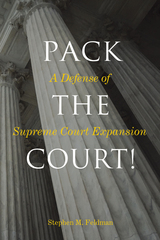
The United States Supreme Court has numbered nine justices for the past 150 years. But that number is not fixed. With the Democrats controlling the House and Senate during the Biden presidency, they could add justices to the Supreme Court. But would court packing destroy the Court as an apolitical judicial institution? This is the crucial question Stephen Feldman addresses in his provocative book, Pack the Court! He uses a historical, analytical, and political argument to justify court-packing in general and Democratic court-packing more specifically.
Republicans and Democrats alike profess to worry that court-packing will destroy the legitimacy of the Supreme Court as a judicial institution by injecting politics into a purely legal adjudicative process. But as Feldman’s insightful book shows, law and politics are forever connected in judicial interpretation and decision making. Pack the Court! insists that court packing is not the threat to the Supreme Court’s institutional legitimacy that many fear. Given this, Feldman argues that Democrats should pack the Court while they have the opportunity. Doing so might even strengthen the American people’s faith in the Court.
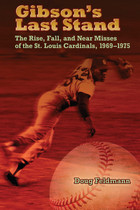
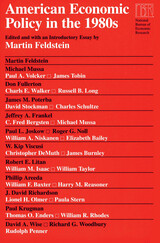
In his introduction, Martin Feldstein provides compelling analysis of policies with which he was closely involved as chairman of the Council of Economic Advisers during the Reagan administration: monetary and exchange rate policy, tax policy, and budget issues. Other leading economists and policymakers examine a variety of domestic and international issues, including monetary and exchange rate policy, regulation and antitrust, as well as trade, tax, and budget policies.
The contributors to this volume are Alberto Alesina, Phillip Areeda, Elizabeth Bailey, William F. Baxter, C. Fred Bergsten, James Burnley, Geoffrey Carliner, Christopher DeMuth, Douglas W. Elmendorf, Thomas O. Enders, Martin Feldstein, Jeffrey A. Frankel, Don Fullerton, William M. Isaac, Paul L Joskow, Paul Krugman, Robert E. Litan, Russell B. Long, Michael Mussa, William A. Niskanen, Roger G. Noll, Lionel H. Olmer, Rudolph Penner, William Poole, James M. Poterba, Harry M. Reasoner, William R. Rhodes, J. David Richardson, Charles Schultze, Paula Stern, David Stockman, William Taylor, James Tobin, W. Kip Viscusi, Paul A. Volcker, Charles E. Walker, David A. Wise, and Richard G. Woodbury.
READERS
Browse our collection.
PUBLISHERS
See BiblioVault's publisher services.
STUDENT SERVICES
Files for college accessibility offices.
UChicago Accessibility Resources
home | accessibility | search | about | contact us
BiblioVault ® 2001 - 2024
The University of Chicago Press





